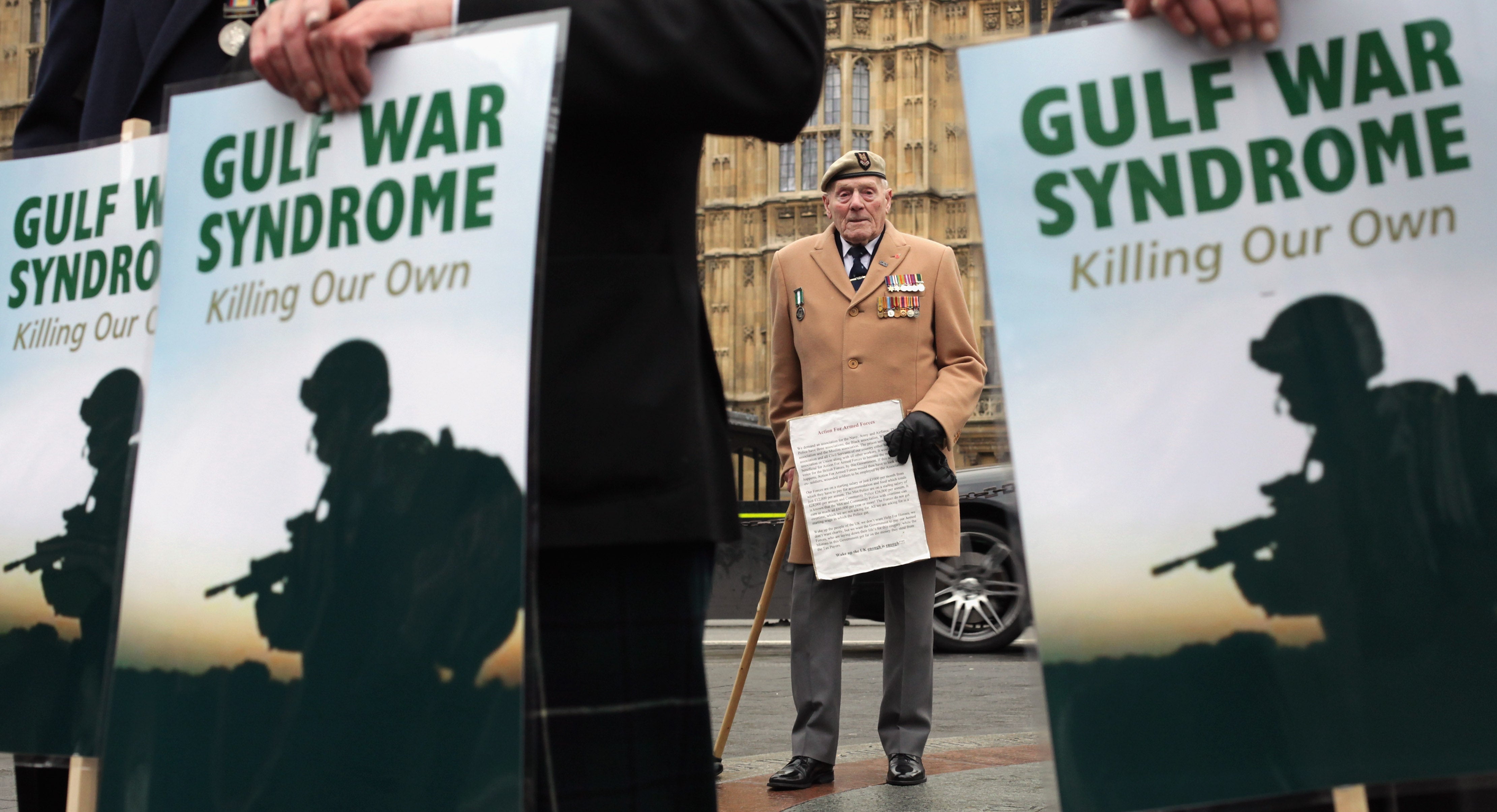Gulf War syndrome not from depleted uranium but likely sarin, study finds
Quarter of a million veterans suffer long-term illness that appears rooted in neurological impairment

Gulf War syndrome was not caused by debris from depleted uranium munitions but is likely to have been caused by exposure to sarin, a “conclusive” study has found.
A quarter of a million UK, US and allied nations veterans have suffered long-term illness since the conflict three decades ago.
Acute and chronic symptoms include fatigue, headaches, joint pain, indigestion, insomnia, dizziness, respiratory disorders and memory problems, and scientists believe it appears rooted in neurological impairment.
Researchers from the University of Portsmouth tested sufferers to examine levels of residual depleted uranium in their bodies and said the study “conclusively proves” that none were exposed to any significant amounts of depleted uranium.
Professor Randall Parrish said: “For decades, medics and scientists have been looking for the elusive cause of Gulf War illness.
“That depleted uranium is not and never was in the bodies of those who are ill at sufficient quantities to cause disease will surprise many, including sufferers who have, for 30 years, suspected depleted uranium may have contributed to their illness.”
The testing considered the predicted decline in depleted uranium from normal metabolism over the time since potential exposure and testing, by using a highly sensitive method of testing in conjunction with metabolic modelling.
Prof Parrish said the most likely remaining causes for the illness are low-level and widespread exposure to sarin nerve agent released widely from the destruction of Iraqi chemical weapons caches in January 1991, possibly compounded by the use of organophosphate anti-nerve agent medication and the liberal use of pesticides to prevent malaria exposure to allied forces.
“Depleted uranium munitions were used in the conflict as an effective weapon to destroy Iraqi tanks, and its use has littered Iraq and Kuwait with uranium contamination, potentially affecting local people,” he said.
“Medical studies have shown that it can cause cancers and birth defects and for decades it has been alleged to be a smoking gun in Gulf War illness, which affects about 250,000 of the 750,000-plus allied forces who served in the six-month conflict.
“The plausibility of the link between depleted uranium and the illness has bubbled along now for nearly 30 years, but we would argue it’s time to look elsewhere.”
Prof Parrish developed a method of detecting depleted uranium in urine from an exposure many years earlier and tested 154 well-monitored US Gulf War veterans who have the illness.
Not a single trace of depleted uranium was found in the samples following testing, which is 10 times more sensitive than previous procedures, and no differences were found to a control group, according to the study carried out with Dr Robert Haley, of the University of Texas Southwestern Medical Centre in Dallas, and published in the journal Nature Scientific Reports.
Prof Parrish said: “Being able to debunk the alleged connection between this illness and this radioactive substance allows the medical community to focus more clearly on what the likely cause(s) actually are.
“Finding causes is a nebulous game when you have so many options to blame. The allies’ own activities destroying an Iraqi nerve agent cache or spraying pesticides liberally on troops could be seen in hindsight as an inadvertent ‘own goal’ and one to be avoided in future conflicts.
“It is important to find causes for conditions like this, even if it takes a long time and the causes might be controversial.”
The Royal British Legion said its research suggests up to 33,000 UK Gulf War veterans of the more than 53,000 deployed as part of the US-led campaign against Iraq’s invasion of Kuwait could be living with the syndrome.
Some 1,300 are claiming a war pension for conditions connected to their service in the Gulf.
Andy Pike, the head of policy and research at the Royal British Legion said: “Whilst we welcome further research that helps to improve our knowledge of the experiences faced by Gulf War veterans, there has been little meaningful research published in the UK concerning effective treatment for those suffering from Gulf War illnesses.
“It is likely this lack of understanding has had a serious impact, leaving many veterans living with debilitating conditions 30 years after the end of combat operations.”
A Ministry of Defence spokesperson said: “We are indebted to all those who served our country in the Gulf wars and have already sponsored significant research into the effects of this conflict on veterans.
“Although we have no plans to conduct further studies, we continue to monitor any Gulf War research that is published around the world.”
Join our commenting forum
Join thought-provoking conversations, follow other Independent readers and see their replies
Comments
Bookmark popover
Removed from bookmarks